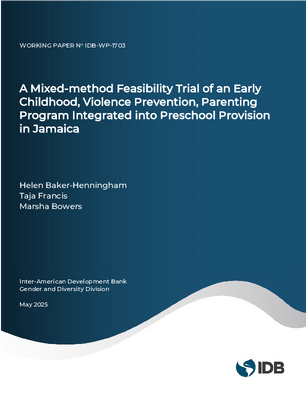A Mixed-method Feasibility Trial of an Early Childhood, Violence Prevention, Parenting Program Integrated into Preschool Provision in Jamaica
Date issued
May 2025
Subject
Violence Prevention;
Teacher;
Child Abuse;
Children;
Preschool Education;
Educational Institution;
Childhood;
Population Aging;
Parenting Intervention;
Labor Force
JEL code
I10 - Health: General;
I20 - Education and Research Institutions: General;
J12 - Marriage • Marital Dissolution • Family Structure • Domestic Abuse;
J13 - Fertility • Family Planning • Child Care • Children • Youth
Country
Jamaica
Category
Working Papers
We adapted a violence-prevention, parenting program (the Irie Homes Toolbox, or IHT) for integration into Jamaican preschool services. The adapted IHT was evaluated in a mixed-method feasibility trial in Kingston, Jamaica. Twenty-four preschools were randomly assigned to intervention (n12) or wait-list control (n12). Ten caregivers per school were recruited (n240, n120/group). The program consisted of eleven 1-hour parenting sessions delivered by a preschool teacher with groups of ten caregivers of children aged 2-6 years. In the impact evaluation, the primary outcome was caregivers' use of violence against their child (VAC). Secondary outcomes were caregivers' involvement with their child, attitude to VAC, preferences for harsh punishment, self-efficacy, and child conduct problems. All outcomes were measured by caregiver-report, and we test for and find no evidence of social desirability bias. We measured fidelity of implementation on an ongoing basis. We also conducted in-depth interviews with participating teachers and kept ongoing logs on intervention implementation. Participants attended a mean (SD)4.0(3.1) sessions. The IHT intervention led to reductions in caregivers' use of VAC (ES-0.22, p0.04) and caregivers' favorable attitudes to VAC (ES-0.36, p0.01), and increases in caregivers' involvement with their child (ES0.30, p0.005) and parenting self-efficacy (ES0.29, p0.02). Reductions in caregiver preferences for harsh punishment were significant at p0.07 (ES-0.21). We found no benefits to child conduct problems. Through observations of session quality, interviews with preschool teachers, and research team logs, we identified enablers and barriers to intervention implementation and suggestions for improvement. The program has potential for large-scale dissemination to reduce VAC in Jamaica.
Generative AI enabled




